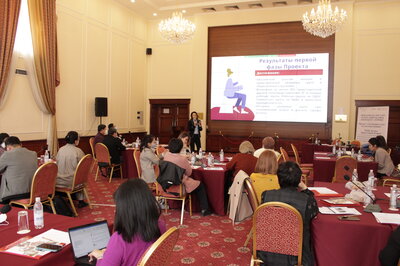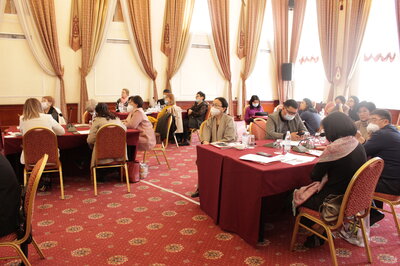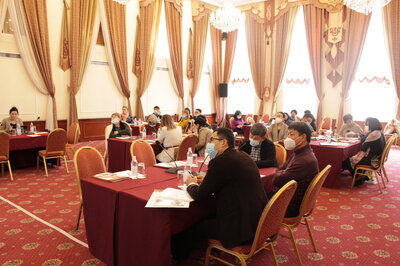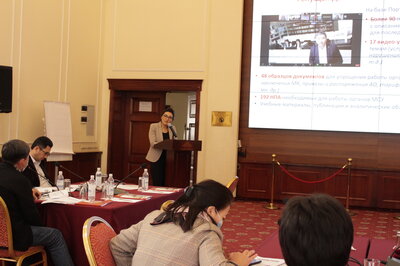On April 22, 2021, within the framework of the Public Service Improvement Project a roundtable was held with the representatives of international and non-governmental organizations, as well as gender experts. There were more than 30 participants at the round table, including those who joined online.
First, participants were introduced with the ongoing work of the Project on the implementation of socially inclusive and gender responsive (hereinafter SIGR) policies in the sphere of public services at the local level. The presentation included information on the project strategy in this direction and the results of the work that was carried out in the targeted municipalities of Issyk-Kul and Jalal-Abad regions. Further presentations were made by the representatives of CSOs “Rural Life”, “Women’s Peace Bank” and the “Civil Initiatives Centre Leader”, which worked in those areas, but in municipalities that are not partners in the second phase of the project. In their presentations, representatives of the organizations described how they worked in the face of the pandemic and how they were able to achieve meaningful results, despite the difficulties and restrictions imposed. They demonstrated the socially inclusive and gender responsive aspects integrated in the socio-economic development programmes of municipalities as a result of training and follow-up consultations.
Chairperson of the Board of DPI, Dobretsova Nadezhda made a presentation on "Inclusive local development" or so-called ‘inclusive growth’, the essence of which is "the need to reduce inequality between different groups of people, in order to achieve greater stability of society." She also introduced participants to the concept of a new tool/mechanism for auditing the inclusiveness of local development programmes. The creation of such an integrated development system is essential in order to ensure that LSG bodies use all available strategies for sustainable and inclusive development of the local economy and community as a whole.
At the end of the presentations, all participants were engaged in the discussion, asked their questions and offered their recommendations to the project in improving the work on the tasks in mentioned areas. One of the experts of an international organization was interested in the criteria by which the existing municipalities' SEDPs were considered/recognized as not containing socially inclusive and gender-sensitive approaches. He also noted the need for the appropriate formulation of the newly introduced activities in the developed SEDPs so that the LSG bodies could implement these activities without going beyond their competencies. A proposal to introduce a so-called gender marker (e.g. 30%) in relation to activities, financed from local budget and considered as socially inclusive and gender responsive measures, was also recommended. In addition, better coordination among the various projects working in the same field was proposed to avoid duplication of work in the same municipalities. The majority of participants agreed on the importance of implementing socially inclusive and gender-responsive policies at the local level and called for sharing best practices as an example among other municipalities.
The Public Service Improvement Project is funded by the Swiss Government through the Swiss Agency for Development and Cooperation and is implemented by Helvetas Kyrgyzstan and the Development Policy Institute.





